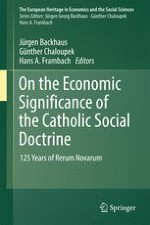2017 | OriginalPaper | Buchkapitel
125 Years Rerum novarum—The Theological Perspective
verfasst von : Peter Schallenberg
Erschienen in: On the Economic Significance of the Catholic Social Doctrine
Aktivieren Sie unsere intelligente Suche, um passende Fachinhalte oder Patente zu finden.
Wählen Sie Textabschnitte aus um mit Künstlicher Intelligenz passenden Patente zu finden. powered by
Markieren Sie Textabschnitte, um KI-gestützt weitere passende Inhalte zu finden. powered by
